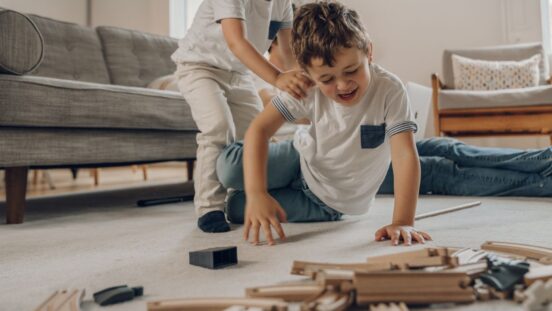Raising Boys: Parenting Expert, Maggie Dent helps out boy-dads, Fitzy and Wippa
"Sometimes you don’t have to talk but actually you are communicating enormously that you are connected and that you care."
Ask most parents of boys what it’s like and the story will often be the same: They give us our biggest heart feels and make us tear out our hair in equal measure!
That’s oh-so-true for boy-dads, Nova 96.9’s Fitzy & Wippa who sat down with parenting expert Maggie Dent on Thursday to get her insight on a couple of issues they’ve been having while raising their boys.
Maggie’s insight into how boys view of the world changes as they grow up, how to keep the lines of communication open, reveals the tricks to keeping young boys motivated and how to approach puberty in teenage boys is a gift for any parent on the frontlines of raising boys.

Parenting expert, Maggie Dent is the author of From Boys To Men; Guiding our Boys to Grow to Happy Healthy Men.
For Wippa, fears of a future with a kleptomaniac son were laid to rest as Maggie – who is the author of From Boys To Men; Guiding our Boys to Grow to Happy Healthy Men – helped him navigate the fact that his four-year-old son, Jack had been pinching toys from the shops.
Dad-of-two, Fitzy got some useful tips on how to get his boys, 11-year-old Hewie and seven-year-old Lenny to come out of their shell and not fear failing so much.
Let’s face it, we could all do with some help when it comes to raising our boys, so we’ve shared Maggie’s wisdom below …
WATCH: Maggie Dent helps out boy-dads Fitzy & Wippa. Continues after video …
Dad-of-three, Wippa asked: “Maggie I want to know because my son is five, I’ve heard that when kids are seven, that’s when they shut down and internalise things. The big thing think with modern day parents is that they just want to keep the conversation going so that when things get a little more serious at the age of 15/16 they’re still open to talking through things. Is there a technique to making sure they still discuss things with you?”
Maggie answered: “Absolutely. Eight is the more tricky age, they get a lot more sensitive and nine is the age when they realise ‘wait on a minute’, there aren’t super heroes and all the rest of it and the world starts resetting and it gets a bit disappointing.
“There’s also some laying down of some different hormones, a lot of boys will say things in that range of ‘oh I just want to die, nobody cares!’ and they make these really giant statements they don’t really mean it. They’re trying to show us how big their feeling is.
“My big one is, it’s actually being present, being present when they’re not necessarily wanting to talk, if you’ve got a common interest, for example I was a massive basketball freak so I would be there out there shooting hoops and gradually they would come out there with you you know. So sometimes movement opens boys mouth, going for a walk, going for a surf, going fishing. Whatever you might do actually creates the presents and they know you’re really there.
“Where as a lot of parents are struggling with the gosh damn phone in their hand, boys see a phone in your hand, or they hear a phone on the bench beep and they just walk away, they really really sensitive to you not being present. Sometimes you don’t have to talk but actually you are communicating enormously that you are connected and that you care. That’s the difference.”

Dad-of-three Wippa wonders about communication.
Maggie continued: “Once they’ve gone through that shift, they often can settle, the later part of 9/10 even 11. They can actually become happy, jolly and complicated, friendly boys who do the dishwasher the first time you ask them.
“Then we know there’s that shift again, sometimes parents who have a son that’s really tall, they think he’s matured. That’s just the body, it’s like a Porsche with no brakes and I think that’s one of the challenges. When people understand that biological changes, the brain changes, the hormones change, the cognitive changes, the emotional changes that are happening randomly and strangely, they have no idea why they feel so lousy.
“When we’re able to help them understand it, then they’re more likely to come to us when they’ve messed up or made a lousy choice in life and that is what we really have to have them do, turning to us to fall on when things go bad. Instead of what we have now which is an increase in anxiety, depression, self harm and suicide.”
Wippa went on to ask: “For my little boy, he’s four now, he’s a second child and he’s a loose unit and he started stealing things from the toy store!”
Maggie answered: “If a four-year-old boy see something they really really want, and then you say ‘we don’t take people stuff because that stealing’, there are two different conflicting thoughts he can have in his mind. That impulse to have it is simply stronger because he is four, he’s not eight, no matter how many times you say it, the impulse to have stuff is stronger.
“Keep reminding him again that there are times that if there is something that you want, we have to work out a way that you can do some chores or earn some money, so you can get that. And that’s a goal and has been done in a way that’s okay.”

Dad-of-two Fitzy wonders how to get his boys out of their comfort zone.
Dad-of-two, Fitzy had some questions about confidence.
“I’m finding it hard to get my boys to come out of their comfort zone, to get motivated to do things. If there’s an option of putting yourself out there and getting up in front of the class and speaking or not doing at all, they’re taking the easy option. Whether it comes to sport or whatever. I’m trying to teach them now that they need to take risks and put themselves out there”
Maggie shared the following wisdom: “That sounds like a classic anxiety thing, just in case I fail.
“One of the thing we know for boys and men if that they take an external event for which they aim and set themselves up for, if they win or they do well they give themselves self-worth. No one else can give that to a boy, so what they’ve seen is that ‘well chances of this going well aren’t good’ so rather than fail they just won’t do it.
“Endless card games, go back to your noughts and crosses, because the more frequently they lose the better they get at losing and getting on with it.”




